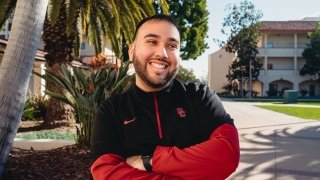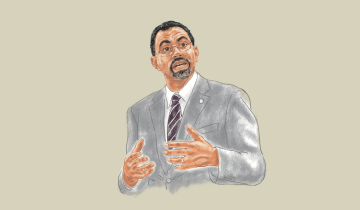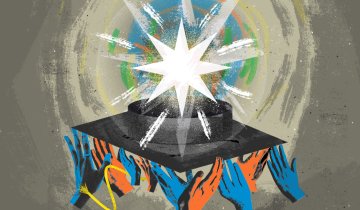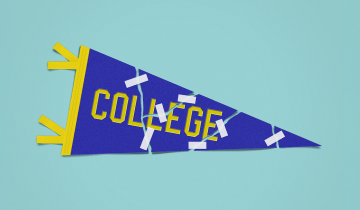Alexis Linares-Sierra was born and raised in Southeast Los Angeles, a child of immigrants from El Salvador. He describes his upbringing in South Gate as full of financial and academic hardships. His background used to be something that embarrassed him, but these days, he’s embracing it. He realizes now that his story of struggle in the Los Angeles Unified School District is something many people can identify with. He has “a lot of gratitude for how far I’ve made it,” and he’s proud to be part of the South Gate community.
But when it came time for Linares-Sierra to go to college, he wanted to put some space between himself and what he knew. When he wasn’t able to afford the cost of a four-year college, despite being accepted, he set his sights on Santa Monica College. “I wanted a fresh start,” he says, a place where he wasn’t likely to bump into anyone from high school.
His sister was the only person he knew who went to college, but she was also trying to navigate higher education. Linares-Sierra was largely on his own until he met Rosa Martinez, a counselor at Santa Monica College’s Latino Center. “I have to give Rosa her flowers for this,” Linares-Sierra says. “She was the first counselor or educator to really validate my feelings, celebrate my identity, and break down to me what college is and the potential that I have.”
Martinez, a first-generation college student herself, describes her approach to counseling as holistic. She sees herself as “a sort of cheerleader for my students.” “It is important to address all aspects of a student's experience and make sure to address the academic and the personal in the process of meeting their goals,” Martinez says. She empowers and supports the students she meets “with knowledge of information and resources available to achieve academic success.”
After Linares-Sierra’s initial meeting with Martinez, he left her office with a wealth of resources, a strong desire to get engaged in campus activities and “a sense of belonging.” He became actively involved in the Latino Center’s Adelante Program, a program designed to support the specific counseling and academic needs of Latino students and foster academic achievement, cultural awareness, and personal growth; the Grade Appeals Committee; and the Scholars Program, which prepares students from underserved areas for transfer to a four-year university.
After two years at Santa Monica College, Linares-Sierra was accepted to UC San Diego and enrolled his junior year. It was 2020—the beginning of the COVID-19 pandemic—when it came time for him to start at UC San Diego, but quarantine did not stop Linares-Sierra. He had been given a fantastic financial aid package that included guaranteed housing. “Let’s go for it. I went to learn how to be independent,” Linares-Sierra recalls thinking as he left South Gate for UC San Diego’s costal campus.
Despite the complications of meeting new people due to the pandemic, Linares-Sierra joined as many extracurricular activities that he could, meeting some of his “lifelong best friends” along the way. The puzzle pieces to his career also began to fall into place. It was at UC San Diego that he realized he had “a passion for higher education.” He began working at the Triton Transfer Hub which provides support for first-year and transfer students. He deeply admired his colleagues and the work they were doing. His supervisor told him that he thought he would make a wonderful counselor. At first, Linares-Sierra didn’t take the idea seriously, but after some continued urging, he decided to apply to USC Rossier’s EC program.
As soon as he enrolled in USC Rossier’s Master of Education in Educational Counseling program (EC), Linares-Sierra employed his tried-and-true formula for success in higher education: getting involved. He’s a member of the USC Graduate Student Government Senate and is using his position to advocate for his fellow students, specifically to secure additional professional development funds for graduate students. He’s also a part of the Senate’s Grants Review Committee and is an ambassador for USC Rossier’s EC program.
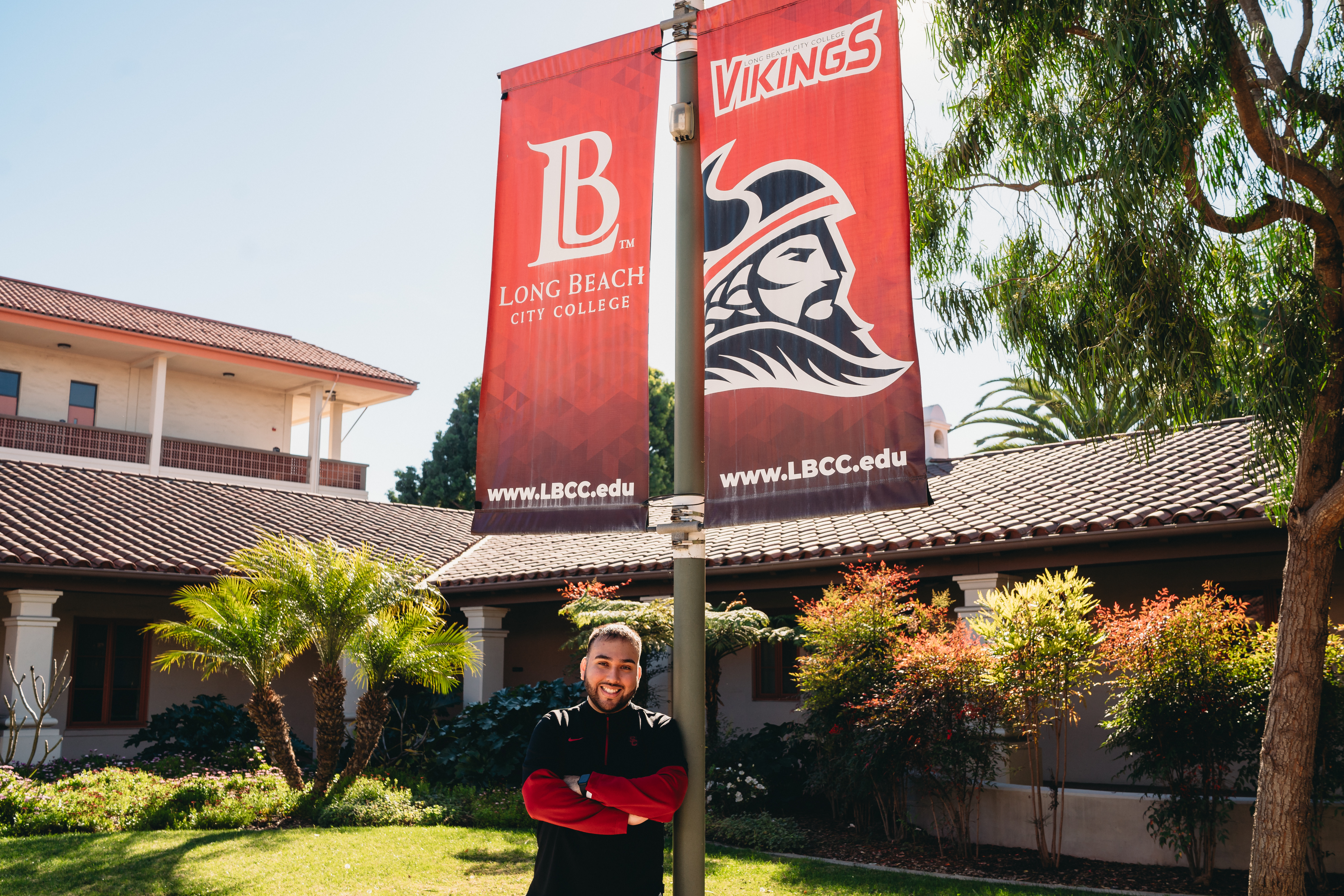
One of Linares-Sierra’s favorite aspects of the EC program is the cohort model. He has formed strong relationships with his cohort mates and was pleasantly surprised to see so much diversity in his classes. “I am so happy that there are so many people of color from different backgrounds. Identities intersecting—I think that’s so beautiful,” he says. His cohort “have helped me grow professionally and become a better individual,” he says. “They gave me a reminder that there are really good people out in the world, and I know that the future of higher education is going to be in good hands with them.”
Linares-Sierra sees himself as lucky. He credits that meeting at Santa Monica College with Martinez as changing the course of his life. “I want to do the same for individuals who are either in similar positions as me, or in more extreme circumstances,” he says. This spring, Linares-Sierra is looking forward to a full-circle moment. For his graduation project, he will conduct research at the Adelante Program where Martinez still works as a counselor.
He is set to graduate in May 2024 and is already working in the field. He’s a transfer mentor at Cypress College’s Transfer Center and is a lead student success coach for the First Year Experience program at Long Beach City College.
While at USC Rossier, he’s finetuned his theoretical framework and educational philosophy when it comes to counseling students. He’s found professor Kortney Hernandez particularly influential.
“Much of the theoretical framing and educational philosophy from [my courses] are grounded in critical pedagogy and the notion of teaching as an act of love,” Hernandez says. This is a concept she took from the mentorship of one of her own graduate professors, Antonia Darder, who, in turn, was heavily influenced by the mentorship she received from Paulo Freire. “By centering love as praxis in educational counseling, Alexis recognizes the power of relationships, the value of building community, and the importance of honoring the wisdom that students bring into any space,” Hernandez says.
Linares-Smith describes the approach he is cultivating as student-centered and holistic. “I want to build rapport with students and get to know them as human beings first. I also utilize a proactive approach, giving students a step-by-step process in making sure they get the support they need,” he says. He also centers validation theory. “Students are academically capable, no matter where they come from,” he says “[but] they need that emotional support, and I want to make sure that I’m that emotional support for them.”
Linares-Sierra has been busy applying to doctoral programs in education. The support he’s received at USC Rossier has allowed him to see himself in that light—someone capable of being a doctor of education. When he graduates this May, he will be the first in his family to earn a master’s degree.
“Education wasn’t made for us,” Linares-Sierra says, thinking of his parents’ humble roots in El Salvador and the tiny pueblo, Paraje Galán, where they grew up. But Linares-Sierra is living proof that there are people working in education to shift that narrative, and he’s hoping to write the next chapter.

